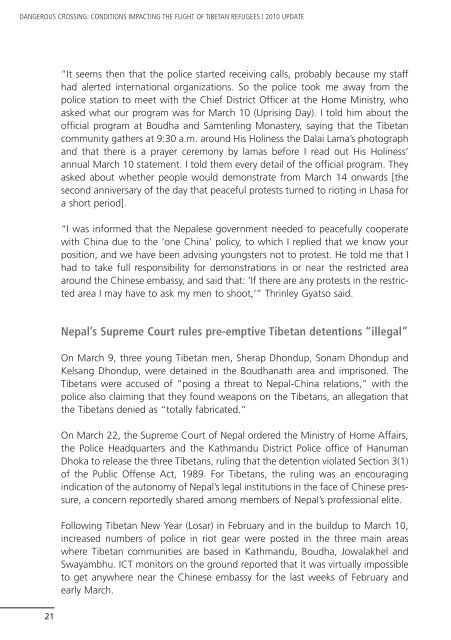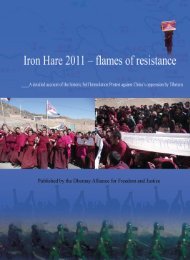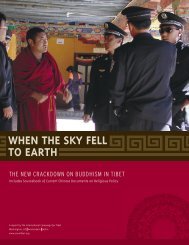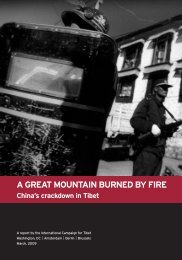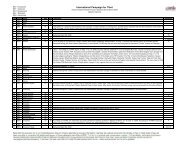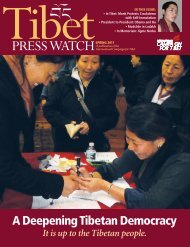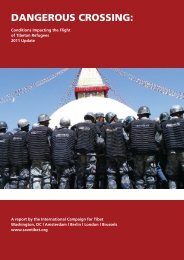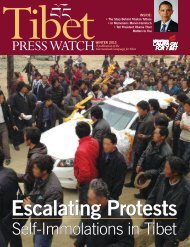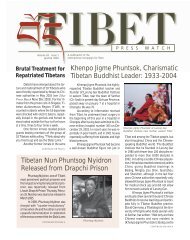DANGEROUS CROSSING: - International Campaign for Tibet
DANGEROUS CROSSING: - International Campaign for Tibet
DANGEROUS CROSSING: - International Campaign for Tibet
You also want an ePaper? Increase the reach of your titles
YUMPU automatically turns print PDFs into web optimized ePapers that Google loves.
<strong>DANGEROUS</strong> <strong>CROSSING</strong>: CONDITIONS IMPACTING THE FLIGHT OF TIBETAN REFUGEES l 2010 UPDATE<br />
21<br />
“It seems then that the police started receiving calls, probably because my staff<br />
had alerted international organizations. So the police took me away from the<br />
police station to meet with the Chief District Officer at the Home Ministry, who<br />
asked what our program was <strong>for</strong> March 10 (Uprising Day). I told him about the<br />
official program at Boudha and Samtenling Monastery, saying that the <strong>Tibet</strong>an<br />
community gathers at 9:30 a.m. around His Holiness the Dalai Lama’s photograph<br />
and that there is a prayer ceremony by lamas be<strong>for</strong>e I read out His Holiness’<br />
annual March 10 statement. I told them every detail of the official program. They<br />
asked about whether people would demonstrate from March 14 onwards [the<br />
second anniversary of the day that peaceful protests turned to rioting in Lhasa <strong>for</strong><br />
a short period].<br />
“I was in<strong>for</strong>med that the Nepalese government needed to peacefully cooperate<br />
with China due to the ‘one China’ policy, to which I replied that we know your<br />
position, and we have been advising youngsters not to protest. He told me that I<br />
had to take full responsibility <strong>for</strong> demonstrations in or near the restricted area<br />
around the Chinese embassy, and said that: ‘If there are any protests in the restricted<br />
area I may have to ask my men to shoot,’” Thrinley Gyatso said.<br />
Nepal’s Supreme Court rules pre-emptive <strong>Tibet</strong>an detentions “illegal”<br />
On March 9, three young <strong>Tibet</strong>an men, Sherap Dhondup, Sonam Dhondup and<br />
Kelsang Dhondup, were detained in the Boudhanath area and imprisoned. The<br />
<strong>Tibet</strong>ans were accused of “posing a threat to Nepal-China relations,” with the<br />
police also claiming that they found weapons on the <strong>Tibet</strong>ans, an allegation that<br />
the <strong>Tibet</strong>ans denied as “totally fabricated.”<br />
On March 22, the Supreme Court of Nepal ordered the Ministry of Home Affairs,<br />
the Police Headquarters and the Kathmandu District Police office of Hanuman<br />
Dhoka to release the three <strong>Tibet</strong>ans, ruling that the detention violated Section 3(1)<br />
of the Public Offense Act, 1989. For <strong>Tibet</strong>ans, the ruling was an encouraging<br />
indication of the autonomy of Nepal’s legal institutions in the face of Chinese pressure,<br />
a concern reportedly shared among members of Nepal’s professional elite.<br />
Following <strong>Tibet</strong>an New Year (Losar) in February and in the buildup to March 10,<br />
increased numbers of police in riot gear were posted in the three main areas<br />
where <strong>Tibet</strong>an communities are based in Kathmandu, Boudha, Jowalakhel and<br />
Swayambhu. ICT monitors on the ground reported that it was virtually impossible<br />
to get anywhere near the Chinese embassy <strong>for</strong> the last weeks of February and<br />
early March.


